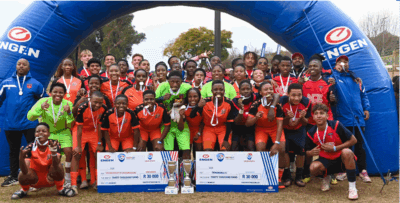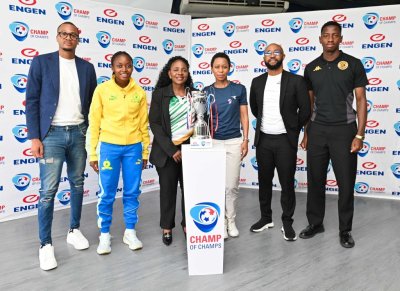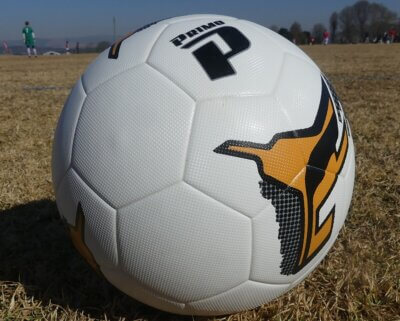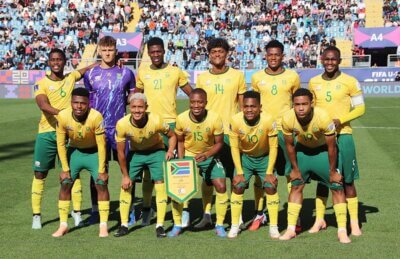“We’re looking to make a statement”: Panorama coach Luyanda Gcabashe

The 2025 Gauteng Development League (GDL) season has been the league’s most competitive season yet, with the established powers being pushed harder than ever before. Consequently, no clear title favourite has emerged.
This week, the Gauteng Engen Knockout Challenge winners, Panorama FC, host Kathorus Hyper Academy in a highly anticipated clash.
Panorama heads into the game off the back of a 0-2 defeat to Highlands Park at Balfour Park last week, while Kathorus Hyper Academy shared the points with Elspark United on Saturday.
In an exclusive interview with SuperSport Schools Plus, coach Luyanda Gcabashe said his side is seeking redemption and that means Kathorus Hyper Academy is going to face the best of Panorama FC.
“We are playing at home, and I feel sorry for Kathorus Hyper Academy because we’re going to go all out, and we are going to make a statement because we are coming off a loss.” he said. “This game, we’re going to come very, very strong.
“If you check our results, we are stronger in our home games. So, after the Engen Knockout Challenge, the first game, two weeks ago, we played Elspark United at home, and we won 4-0.
“Then, last week, we played away against Highlands Park. For that game, I tried to rotate the team, and we ended up losing for the first time in perhaps two to three months.”
Panorama’s victory in the Engen Knockout Challenge shattered the status quo and sent shockwaves through the football community. How could a team as small as Panorama win a competition that also featured big clubs, including Kaizer Chiefs, Mamelodi Sundowns, and Orlando Pirates?
Their Engen Knockout Challenge title-winning success was another vivid display of the evolution of academy football in the Gauteng region. The gap between the big guns and the rest has become blurred.
Gcabashe said the upskilling of the coaches at the smaller clubs has made a massive difference in levelling the playing field. Broadcasts on SuperSport Schools, too, has helped teams better prepare for their opponents, providing coaches with the data they need to scout the opposition.
In April, Gcabashe graduated with a CAF B licence and has since put the knowledge he accumulated to good work
“What I used to say, as coaches, education really helps, because if you check all the coaches in the GDL, most of us are now qualified. For instance, when I just graduated in April, I got my CAF B diploma licence. So, I’m a coach. I’m earning now. I’m qualified,” Gcabashe commented.
“So, after that, I’ve been improving as a coach. We are doing well. We are trying to close the gap between the amateur clubs and elite academies, the PSL teams. We are competitive this season.
“After what we did in the Engen Knockout Challenge, there are so many approaches. The big teams are after my players, which is a good sign for them.”
Reflecting on the build-up to the Engen Knockout Challenge, Gcabashe highlighted tactical flexibility, team building and unity as the ingredients that were the key to his side’s success.
His players’ confidence and motivation were massively boosted after their title win, he added. “Right now, the players are very motivated,” he said. “The unity in the team is incredible.
“We had two team buildings before the Engen Knockout Challenge, to revive the team, to make sure there’s unity. That’s how I won the Engen Knockout Challenge, because I did not have even a single star in my team,” he explained.
“However, what we had was unity in the team. We had the right characters, the desire, the willingness to fight for each other. That’s what I was instilling in my team. We had to drill in tactical discipline, as well, and now they understand.
“As a result, we now have a good team structure. The players know when, where, and how to behave in different situations.
“When we lose the ball, we defend as a team. When we attack, we attack as a team. So, that was my strength in that tournament.
“Also, what I did was to always have tactical flexibility because we approached each game according to the opposition’s strength and weakness. So, when we played any team – Orlando Pirates, for example – we knew exactly what tactical adjustments we needed to make. We knew we had to go with the high press.
“When we played another team – maybe SuperSport United – we had to close the corridors centrally and press from the centre because we knew they wanted to combine and play a long target. That’s how our flexibility came into play.”








